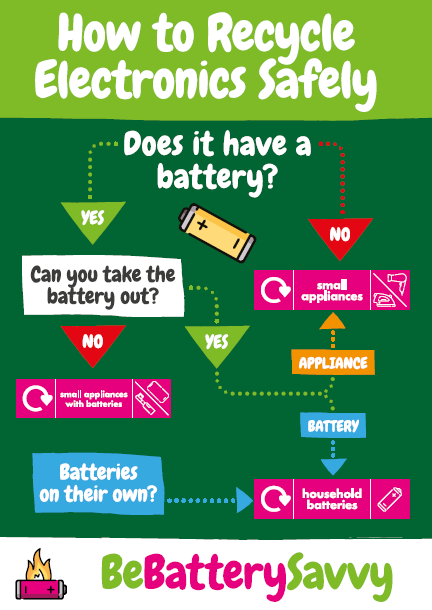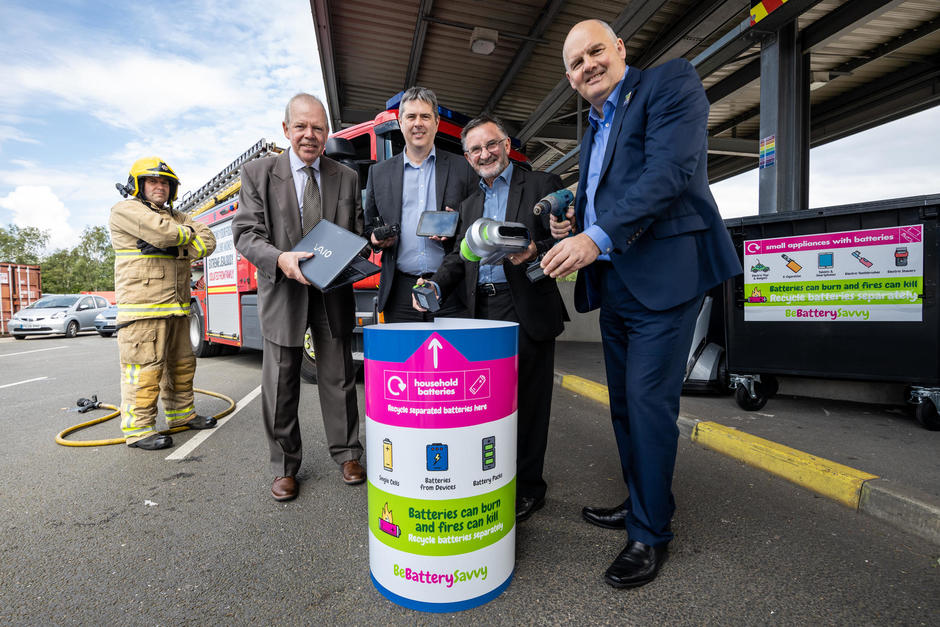Recycling batteries separately and safely
“Batteries can burn and fires can kill – Recycle batteries separately” is the strong message by local firefighters and recycling officers who have teamed up to form a new campaign urging people to ‘BeBatterySavvy’ and recycle their batteries separately and safely.
The campaign has come about after a series of battery-related fires across the recycling and waste industry. If electrical products are disposed of with batteries still inside they can be damaged during transit and potentially cause intense fires.
All of Merseyside’s Recycling Centres accept separate batteries and electrical appliances that have had batteries removed. However, not all sites can safely take appliances which still contain batteries.
It is recognised that it is sometimes not possible to remove batteries from electrical products and therefore, as part of the campaign, three of the Merseyside Household Waste Recycling Centres will have dedicated “Small Appliances with Batteries” containers where people can take those products that still contain batteries. The three dedicated sites are:
- South Sefton Household Waste Recycling Centre, Irlam Road, Bootle L20 4AE
- Old Swan Household Waste Recycling Centre, Cheadle Avenue, Liverpool L13 3AF
- Huyton Household Waste Recycling Centre, Wilson Road, Huyton L36 6AD
All of the Merseyside Recycling Centres (including the 3 above) will be able to accept separated batteries and electrical appliances that have had batteries removed.
Wherever possible customers are being asked to separate batteries from electrical appliances to reduce the risk of fire. Putting batteries safely in the special battery disposal containers ensures they are properly identified, carefully handled and transported safely to specialist recycling facilities.

Many shops have a battery bank for ordinary household batteries – to find out where locally visit www.recyclenow.com. For more information about recycling across Merseyside visit: www.merseysidewda.gov.uk.
Speaking at the launch, Councillor Tony Concepcion, Chairperson of MRWA, said: “We’re seeing an increase in the amount of electrical items coming into our Recycling Centres(1), which is to be expected considering the number of gadgets people use these days. However, this increase is matched by a rise in the number of batteries which, as we’ve seen around the country, can be a potential danger.
“We don’t want to risk fires at our Recycling Centres, or further down the recycling chain, so our message is simple – if you’re bringing an electrical item and/or batteries to recycle then please follow the guidance on site and recycle separately using the correct containers.”
Batteries, especially rechargeable ones, are used in all kinds of products from mobile phones and cameras to vaping devices as well as cordless appliances and equipment like vacuum cleaners and DIY tools(2). There were nearly 130 fires thought to have been caused by batteries across the UK in 2017-18(3) and in February 2019 there was a large battery fire at a St Helens’ based Waste Electrical and Electronic Equipment (WEEE) plant run by waste company Viridor.
This new initiative is spearheaded locally by Merseyside Fire & Rescue Service and Merseyside Recycling and Waste Authority (MRWA) working with Axion, Eunomia Consulting, S Norton, Veolia, Viridor and Wastecare. The project is funded by the WEEE Fund generated from the WEEE Compliance Fee in 2017(4).

ENDS
For more information contact:
Gareth Morton, Eunomia Research & Consulting Mobile: +44 (0) 774 189 7510 or Head Office: +44 (0) 117 917 2250
Or
John Lally, Communications and Marketing Officer, Merseyside Recycling and Waste Authority, Direct Dial: 0151 255 2568 General enquiries: 0151 255 1444
Notes to Editors:
PHOTOCAPTION:
Local firefighters stand by as Merseyside Recycling and Waste Authority Chair Cllr Tony Conception and Chief Executive Carl Beer, together with Jeff Sears, Director at Veolia Merseyside and Halton, launch the BeBatterySavvy campaign by taking rechargeable batteries out of electronic products and recycling them separately using new facilities at Huyton Household Waste Recycling Centre on June 19th 2019.
(1) Materials deposited at Merseyside Household Waste Recycling Centres:
2017/18 (tonnes) - Household batteries: 13.33 and Small Electricals: 2880
2018/19 (tonnes) - Household batteries: 22.70 and Small Electricals 2906
(2) Rechargeable batteries (especially Li-ion) can be found in any electronic products that can be recharged:
● Laptops, smart phones, tablets etc.
● Cameras, portable radios or speakers
● Vaping devices, rechargeable toothbrushes
● Solar powered devices (containing a battery)
● Cordless (rechargeable) Vacuum cleaners and other cleaning appliances
● Cordless DIY tools such as screwdrivers or drills
● Toys, leisure and sports equipment such as hand-held video game units, electric scooters and hoverboards etc.
At the end of their life, the battery should be removed and the product and battery recycled separately.
(3) Battery fires nationwide
The Environmental Services Association (ESA), the trade body representing the UK’s resource and waste management industry, reports that its members think nearly 130 fires were caused by rechargeable lithium-ion batteries in 2017-18. This is a 5% increase on the previous year.
(4) The WEEE Compliance Fee Fund – Over £11 million is being made available to support environmental projects from money that was collected through the 2017 and 2018 WEEE Compliance Fee mechanism. The fund is expected to be spent over the next three years on a range of activities, including technical research, communications, behaviour change activities and local projects. More information on the WEEE Compliance Fee Fund is available at www.weeefund.uk.


